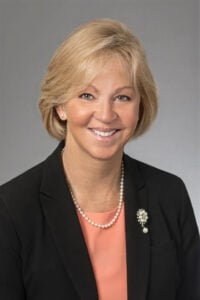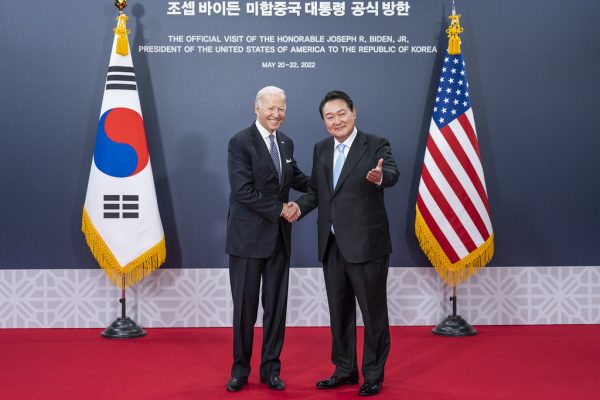The Military Women’s Memorial, built in 1997, serves as testament to the sacrifices and contributions made by women of the U.S. military. (photo courtesy of Military Women’s Memorial, photographer, Karen Saunders)
Established in 1997 to honor the more than three million women who’ve defended America since the Revolutionary War, the Military Women’s Memorial (MWM) has expanded its mission from stories told to lessons learned about the physical and mental well-being of servicewomen.
One of the unsuspecting killers is cardiovascular disease.

CW5 Phyllis Wilson, U.S. (Ret.), Military Women’s Memorial President. (photo courtesy of Military Women’s Memorial)
“We tend, as women, to still correlate heart attack and stroke with more of a male problem set,” said Phyllis Wilson, president of MWM, “when in fact, equal opportunity in the workforce means we get equal stress. Today, we’re pretty much an equal opportunity on heart health.”
According to the National Institutes of Health, cardiovascular disease is the number one cause of death for women in the U.S., responsible for one-in-three deaths among females each year. Additionally, military servicewomen have a higher prevalence rate of heart disease than their civilian counterparts “for reasons not entirely understood,” said Wilson.
In an effort to bring these and other, often underdiagnosed health issues into a public forum, the MWM is launching its “Serving in Strength: A Health & Wellness Series” on February 28, starting with a health awareness symposium focused on heart health and stroke.
By convening medical practitioners and thought leaders from across government, academia, industry, and the civilian sector, MWM seeks to establish a conversation, if not a call to action, between the health-care community and servicewomen and women veterans.
Far from being a new endeavor, the educational series resurrects a program that was created years ago with MWM’s brown-bag “lunch and learn” sessions aimed at educating servicewomen about diseases such as stroke and heart attack, diabetes, osteoporosis, depression, and breast cancer. The intent was to help provide a better understanding about which diseases potentially affected them, what factors put them at risk, and how to recognize symptoms of an illness at the onset stage.
Then as now, the ailments remain, but the growing base of knowledge and the way in which questions are being framed is changing the landscape of health wellness in women.
“We already have the data that women who’ve served in combat zones such as Iraq, Afghanistan, Syria, and other places have a tremendously higher likelihood of developing breast cancer,” observed Wilson. “So why is that? Was it their toxic exposure that caused that? Could it be ill-fitting equipment worn in combat zones that potentially damages the breast tissue? Does that lead to a higher likelihood of breast disease, not just breast damage?
Questions run the gamut, not only for breast health, but also for cardiovascular disease. How do women internalize stress in combat situations? Why is the disease often underdiagnosed? How does it appear symptomatically? The traditional, crushing chest pain, and pains radiating down the left arm aren’t necessarily the same as those exhibited by women, for reasons not entirely understood.
The hope of an answer lies in the questions being raised, asserts Wilson. Even if those inquiries are being met with an “honest we don’t know yet,” she added.
February’s symposium aims to widen the aperture on heart attack and stroke in women by bringing thought leaders, researchers, and practitioners into dialogue with military and military-affiliated women. The theme aligns with MWM’s Health & Wellness series, which is designed to give back to those who’ve served their country by helping them achieve their optimal physical, mental, and emotional well-being.
The upcoming event is free and will be held at the education center in the Military Women’s Memorial located at Arlington National Cemetery, Arlington, VA.

Neoclassic in design, the Military Women’s Memorial stands at the Arlington National Cemetery, in Arlington, VA, a one-of-a-kind historical repository of the stories told by female members of the U.S. Armed Services. (photo courtesy of Military Women’s Memorial)
The welcome remarks will be given by CW5 Phyllis Wilson, U.S. (Ret.), Military Women’s Memorial President, who will introduce the keynote speakers: Rear Admiral Tracy Farrill, Interim Director, Defense Health Network Continental, Defense Health Agency, and Brig. Gen. Deydre Teyhen, Director, National Capital Region, Defense Health Agency. A panel discussion will follow, moderated by: Sharon Bannister DDS, MS, FACD, FICD; USAF Maj Gen (Ret.), MWM Board Member; Andrea Stahl, PhD, Colonel, U.S. (Ret.), Vice President, USU Operations, Henry Jackson Foundation; Seema Reeza, Chairman and CEO, Community Building Art Works; and Lori Highberger, Chief Medical Officer for Behavioral Health, TriWest.
Following the panel discussion, attendees are invited to participate in a special activity related to chronic stress led by Community Building Art Works and the Cohen Military Family Clinic. Chronic stress has long been associated with cardiovascular disease, however researchers are now finding that by engaging in the creative arts, stress can be significantly reduced, helping to lower cortisol levels and decrease blood pressure.
To reserve a ticket, go to: Serving in Strength: A Health & Wellness Series – Heart Health Tickets, Wed, Feb 28, 2024 at 2:30 PM. Registration here.





















Discussion about this post